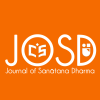What is knowledge if it is not examined? What is truth if it is not tested? The Indic traditions of logic (Nyāya), Tarka, and Mīmāṁsā, Vedānta, Bauddha, Jaina, and others do not treat learning as passive reception but as an active pursuit of truth through rigorous questioning. Unlike the Western dialectical approach that thrives on opposition and refutation, the Bhāratīya tradition seeks to refine, synthesize, and ultimately transcend intellectual divisions to reach the highest pramāṇa—valid knowledge. The educational frameworks of Sanātana Dharma, rooted in these systems of logic, are designed to nurture both the mind and spirit, creating not just scholars, but thinkers capable of deep introspection, debate, and transcendence.
This section of the Journal of Sanatana Dharma seeks to explore the diverse pedagogical methods and logical frameworks that have shaped Indian philosophical traditions. How did ancient masters ensure the precision of thought without suppressing inquiry? What makes the Nyāya system’s structured reasoning different from Aristotelian logic? How did Tarka and Vāda refine not just argumentation but perception itself? Beyond the rigid classrooms of Western academia, Indian pedagogical methods integrated logic and experiential learning, recognizing that true knowledge transcends intellectual gymnastics to awaken the inner self.
We invite contributions on:
- The Nyāya system: Pramāṇas (means of knowledge) and structured reasoning
- Tarka (logic) and Vāda (debate) as tools for refining thought and truth-seeking
- The interplay between Pūrvapakṣa (opponent’s view) and Uttarapakṣa (response) in Indian debates
- Mīmāṁsā and the art of interpreting texts: How hermeneutics shaped philosophy, law, and education
- The role of experiential learning in the Gurukula system: Integrating intellectual, ethical, and spiritual dimensions
- Jaina Syādvāda and Anekāntavāda: The logic of multiple perspectives and non-absolutism
- Bauddha Pramāṇaśāstra: Buddhist epistemology and the psychology of knowledge
- The role of Śravaṇa, Manana, and Nididhyāsana in refining knowledge through reasoning and contemplation
- The impact of Nyāya and Tarka on modern debates, law, and rational discourse
- Reclaiming traditional Indian pedagogical methods in the contemporary era: Decolonizing education and integrating Indic logic into global discourse
We welcome articles, research papers, and explorations that engage with these systems not as relics of ancient thought but as living traditions that offer alternative frameworks for reasoning, learning, and truth-seeking in an age overwhelmed by superficial arguments and ideological biases.
